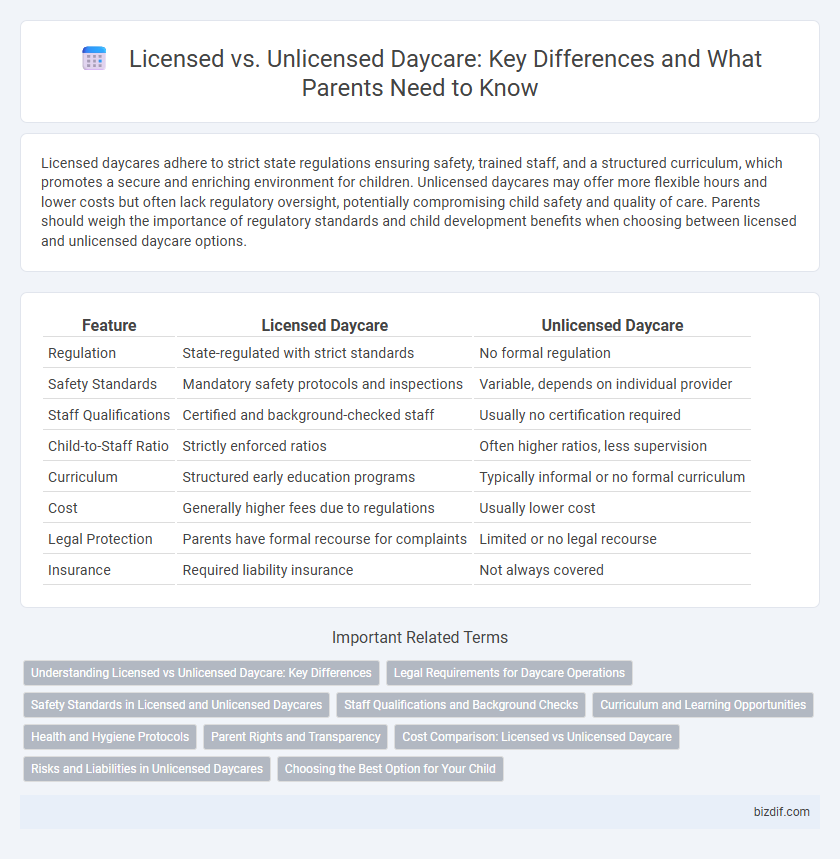Licensed daycares adhere to strict state regulations ensuring safety, trained staff, and a structured curriculum, which promotes a secure and enriching environment for children. Unlicensed daycares may offer more flexible hours and lower costs but often lack regulatory oversight, potentially compromising child safety and quality of care. Parents should weigh the importance of regulatory standards and child development benefits when choosing between licensed and unlicensed daycare options.
Table of Comparison
| Feature | Licensed Daycare | Unlicensed Daycare |
|---|---|---|
| Regulation | State-regulated with strict standards | No formal regulation |
| Safety Standards | Mandatory safety protocols and inspections | Variable, depends on individual provider |
| Staff Qualifications | Certified and background-checked staff | Usually no certification required |
| Child-to-Staff Ratio | Strictly enforced ratios | Often higher ratios, less supervision |
| Curriculum | Structured early education programs | Typically informal or no formal curriculum |
| Cost | Generally higher fees due to regulations | Usually lower cost |
| Legal Protection | Parents have formal recourse for complaints | Limited or no legal recourse |
| Insurance | Required liability insurance | Not always covered |
Understanding Licensed vs Unlicensed Daycare: Key Differences
Licensed daycare centers meet state-mandated safety, health, and staff qualification standards, providing regulated environments for child care. Unlicensed daycares operate without formal state approval, which may result in variable care quality and limited oversight. Choosing a licensed daycare enhances child safety and ensures adherence to established care guidelines.
Legal Requirements for Daycare Operations
Licensed daycare centers must comply with state-specific legal requirements, including staff-to-child ratios, health and safety standards, and background checks to ensure child welfare. Unlicensed daycare operations are not subject to these regulations, potentially increasing risks related to child safety and care quality. Compliance with licensing laws provides parents with assurance of professional oversight and adherence to established childcare standards.
Safety Standards in Licensed and Unlicensed Daycares
Licensed daycares adhere to rigorous safety standards regulated by government agencies, including staff-to-child ratios, sanitation, and emergency preparedness protocols. Unlicensed daycare providers often lack mandatory inspections and standardized safety measures, increasing potential risks to child welfare. Parents should consider these critical safety differences when selecting childcare to ensure a secure environment for their children.
Staff Qualifications and Background Checks
Licensed daycare centers are mandated to hire staff with verified qualifications and conduct comprehensive background checks to ensure child safety and regulatory compliance. Unlicensed facilities often lack standardized requirements for staff credentials and background screening, posing potential risks for children's well-being. Ensuring staff possess early childhood education certifications and cleared criminal records is crucial in maintaining high-quality care standards.
Curriculum and Learning Opportunities
Licensed daycare centers follow state regulations requiring structured curricula and age-appropriate learning opportunities that promote cognitive, social, and emotional development. Unlicensed daycare providers often lack standardized educational programs, resulting in less consistent or comprehensive curriculum delivery. Choosing licensed facilities ensures adherence to developmental guidelines and access to certified educators focused on early childhood learning outcomes.
Health and Hygiene Protocols
Licensed daycare centers adhere to strict health and hygiene protocols mandated by state and local regulatory agencies, including regular sanitation practices, immunization verification, and staff training in infection control. Unlicensed daycare settings often lack formal oversight, increasing risks of inconsistent cleaning routines and inadequate illness prevention measures. Prioritizing licensed facilities ensures a safer environment for children, minimizing exposure to communicable diseases through standardized health guidelines.
Parent Rights and Transparency
Parents have the right to choose licensed daycare providers, which are regulated to meet safety, health, and educational standards enforced by state authorities. Licensed centers must provide transparent policies, including clear communication about staffing qualifications, child-to-caregiver ratios, and emergency procedures. Unlicensed facilities lack formal oversight, reducing guarantees of quality and limiting parents' access to critical information needed for informed decisions.
Cost Comparison: Licensed vs Unlicensed Daycare
Licensed daycare centers typically charge higher fees due to regulatory compliance, staff qualifications, and safety standards enforced by state authorities. Unlicensed daycare providers often offer lower costs but lack formal oversight, which may affect the consistency and quality of care. Parents should weigh the cost savings against potential risks when choosing between licensed and unlicensed daycare options.
Risks and Liabilities in Unlicensed Daycares
Unlicensed daycares carry significant risks including lack of regulatory oversight, which may lead to inadequate safety measures and untrained staff. Parents using unlicensed facilities face liabilities such as limited legal recourse for injury or neglect and potential violations of state childcare laws. Choosing licensed daycare centers ensures compliance with health, safety standards, and professional qualifications, reducing exposure to these risks.
Choosing the Best Option for Your Child
Choosing a licensed daycare ensures your child benefits from regulated safety standards, trained caregivers, and structured curriculum designed to support early development. Unlicensed daycare centers may offer flexible hours and lower costs but often lack formal oversight and standardized quality controls. Prioritizing licensed facilities provides peace of mind and a reliable environment to foster your child's growth and well-being.
Licensed vs Unlicensed Infographic

 bizdif.com
bizdif.com